
Website founded by
Milan Velimirović
in 2006
0:13 UTC


| |
MatPlus.Net  Forum Forum  General General  The problems of my life (I) The problems of my life (I) |
| |
|
|
|
|
You can only view this page!
| | | (1) Posted by Marcos Roland [Friday, Sep 25, 2020 11:53] | The problems of my life (I)
THE BEGINNING OF THE BEGINNING
Recently, our good friend Marjan Kovačević has began a thread asking for composers to answer the question “why and how did you start to compose chess problems”. I liked the question, but I hesitated taking the floor because I was afraid of approaching the theme in a way somewhat “confessional”, and I was not sure if I wanted to confess anything…
But today I turn 70 years, and this is for me more than a birthday, it is a signal of victory. I strongly believe that in all difficult times of the life of individuals and nations, one of the most enduring forces that can counterbalance the always present and powerful destructive forces of this world is the Art. I am in the mood of celebrating my personal victory, and I want to tell my friends when, why and how the Art of composing chess problems entered into my life.
I think I was already sort of a composer even before playing chess, and my first chess game was sort of a composition! I was a teenager, a student of high school in Barra do Piraí, a town of about 70,000 inhabitants at the time (early sixties), located roughly at 120 km from Rio de Janeiro. My parents demanded from me good performance in the studies, and I was doing relatively fine. However, I was not much fond of school homework. I preferred to play football, table tennis, and other games in the facilities available at the gorgeous garden which surrounded the imposing (to my eyes) Cathedral located near our house. One of my elder brothers was good at the “art” of manufacturing kites and their reels, which he used to sell in the neighbourhood, making some money for his nighty adventures. And I helped him, “testing” his products before going to the market. So, uncountable times I would climb a little hill in the vicinities for flying a kite until it nearly disappeared in the blue sky, among the white clouds. Lyrical times…
Football was a great passion, and it is until today, in a different way. But I was not good enough in football (if I were, I really don’t know if I would try anything else in life). I really played very well checkers, the “French checkers”, with its 64 squares board. After my father could not beat me anymore at home, I started to play on the central square of the town. I played there with the taxi-drivers, barbers, clerks ... An old man, retired, used to attend that circle. He had been born in the Northeast of the country, but in his youth he had moved to Rio de Janeiro, like thousands or perhaps millions of others (including my father). In Rio, Mr. Manoel (that was the old man’s name) had been a half-professional checkers player. He really knew about the game, he had read books, he had studied openings, endings. One day, he showed us a composed position, a problem. I became fascinated. Subsequently, I find out that an elder colleague at school, who was one or two years ahead me, also played very well checkers, better than me. And he showed me some problems, too.
Soon I started to compose checkers problems! There was a newspaper from Rio de Janeiro, named “O Jornal”, which kept a weekly checkers column, published on Sundays. So, every Sunday morning, I, who used to avoid my father all the time, was happy in joining him to help him with the purchases at the open market. But before the fruits and vegetables, we used to visit a bookstore on the railway station street, whose owner was a friend of my father, where my dad purchased his “Correio da Manhã”, while I asked him for my “O Jornal”, as a payment for my services…
I used to solve the problems published in the newspaper regularly, soon I was solving them well and quickly, and then, at some point, I started to compose. I composed a half-dozen problems, more or less, and sent them to the editor of the column, a certain Antonio Fabelo Chaves. Then it happened something similar to what Marjan has described about his own experience: the editor generously accepted to publish my problems with a “few” corrections. He praised me, he said I was a friend of his column, a very promising talent, etc. But, in my case, the corrections he made were so important that I barely could recognize the positions he published!...
Then, one day, I composed a really good, absolutely sound problem, and I knew it was good. It was a very important day, the day I found out that I could “create” something. I remember well this problem until today:
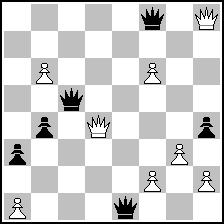 (= 8+6 ) (= 8+6 )
The solution is: 1.d4-e3 c5xa7 2.e3-h6 a7xg1 3.f6-g7 h4xf2 4.h6-d2 f8xc1 5.h8-c3 b4xd2 6.a1-b2 zugzwang. A six-moves combination, ending with a well-known zugzwang position:
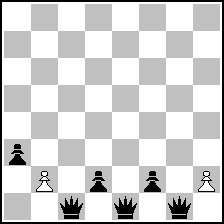 (= 2+6 ) (= 2+6 )
Curiously, I didn’t want to publish my best checkers problem. Probably because at the time the game of checkers was losing space in my (abundant) leisure time to the royal game! This started to happen in a funny way. I had a colleague at school, who was also a neighbour and a companion in my leisure activities. He was from a somewhat “rich” family, his father was a doctor, they had even a car in their garage!... My family was poor, my father was a very principled and strict man, who liked to read books and newspapers, who could write pretty well, but he hadn’t much money. He had to feed my mother and eight children with his not very substantial retirement earnings as a former employee of a railway company. That’s why my two elder sisters started to work early, one as a school teacher, the other as a clerk in a paper company, and they helped somehow at home (incidentally, this was the reason for which my father liked much more his daughters than his sons: my elder brothers didn’t last much time in any job, and I was apparently starting a dubious path in the entertainment sector of the society).
But that colleague (let’s call him “Iago”) was poisoning me with his social prejudices. It was a curious relationship, more usual than one could think: we were good friends, but at the same time we hated each other…I was much better than him at the school, but he was “richer” than me. In those first days of our friendship, he would always imply or suggest that he and his family were more “fancy”, more “intelligent”, more “exquisite” than me and my family. I went to become exasperated with that, and one day I challenged him for a checkers match, which was, in my view, a “game for cultured men, for intelligent people”. He laughed at my face, saying that checkers were a game for barbers (and that was the worst offense he could imagine). “Chess, yes, this is a game for true intelligent people”, he sentenced glacially. I replied: “Oh, really, chess?!! Are you telling me you play chess?” (about chess, I only knew the ancient legend on the Indian old sage which supposedly had invented the game; this tale was told in a book I had read, “Playing Mathematics”). Now I was excited. “A really interesting novelty may be coming from this stupid fellow”, I thought.
“Yes, not only I play chess, but I play chess very well”, said Iago. “The other day, I was challenged at home by a friend of my father, and I delivered him a mate in just four moves”, he added. And he repeated: “Just four moves!”, while he was turning back and taking his way back home, with his peculiar calm, slow, aristocratic steps.
The following day, the first thing I did in the school was approaching Iago and asking him to teach me the rules of chess and tell me how he had succeeded finishing a game so quickly. “O.K., I will tell you”, he said, “but you know I have no much time”. “Let’s use some boring class for your learning”, he added. So, that day, while the teacher of Old Latin was trying to teach some grammar to a completely disinterested class, Iago was whispering chess rules and moves to me. He was sitting in a row next to me. We had no board, no pieces.
While the teacher was writing on the blackboard something like “Lupus agnum devorat”, and some students were sleeping, and others were playing some guessing game appropriate to the occasion, Iago was telling me: “The bishops always move diagonally. Each side has two bishops, one moving just on the light squares, the other just on the dark squares.” “Why this prohibition”, I whispered, “why the bishop cannot visit squares of both colors”? Then he smiled sarcastically and said: “Crazy boy, how would it be possible for a piece which moves just diagonally to play on squares of both colors”? “Ah, O.K.,” I replied, remembering the checkers rules.
In this way, slowly, my colleague taught me the basic rules of chess (excepting castling and en passant capture) in the course of half an hour, more or less. He also described the best he could his “very impressive” game against his father’s friend at home. Only some weeks later, I came across, in a game against my father (he played White), the four-moves mate Iago described, which is well-known, finishing in a position like this:
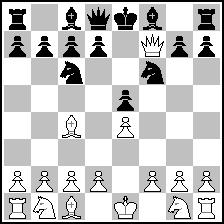 (= 16+15 ) (= 16+15 )
But I hadn’t followed my colleague's lesson with full accuracy! That afternoon, when I was back home and took my checkers board, trying to figure out the moves of Iago’s game, I only could remember which White’s pieces moved: just the King’s pawn, the Queen and the light squares bishop. About pawn moves in general, I just remembered the one-step move, I didn’t remember Iago saying that the pawn could advance two squares on its first move. At least the initial position of the two armies were well impressed on my mind, with the black King heavily parked there on e8, “maybe a little smothered”, I thought.
Then I tried at home to “compose a game” with that limited information I could remember. The first White’s move was 1.e3, of course:
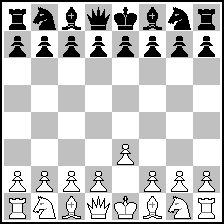 (= 16+16 ) (= 16+16 )
“So what?”, I thought. How would it be possible Black to be mated in just four moves? Being a checkers player, immediately I figured out a lethal attack on the diagonal h5-e8. At that point, I had not enough knowledge to grasp a “kiss-mate” on f7, with the Queen defended by the bishop. Too much sophisticated for me! I could only see simple diagonal checks. Then I found somehow plausible the move 1…f6. A player could find it necessary to give some breath to his King. So, not seeing any other plausible continuation leading to a quick mate, I mentally examined in the partially empty board (I had only the checkers pieces and some coins) the position after 1…f6, and immediately grasped the strong threat carried out by 2.Bd3!:
 (= 16+16 ) (= 16+16 )
“Now the situation seems dangerous for Black”, I thought. What the Iago’s opponent could have played in such a difficult position? I found “plausible and coherent” a move like 2...c6, opening a window for the Queen too, why not? Then the game could be finished with 3.Qh5+ g6 4.Bxg6+ hxg6 5.Qxg6#. In my excitement, I even counted wrongly four White’s moves, not five. I was under the impression I had “reconstructed” the Iago’s game.
I was satisfied with my homework, and I had already a plan for my first chess game: as White, I would start with 1.e3; if I was Black, and my opponent played 1.e3, I would “defend” myself with 1…e6 or even 1…g6, opening also a window for my “dangerous” dark squares bishop!
In the following days, my chess debate with Iago did not continue. I don’t know the reason for that, my memory doesn’t help me on that specific detail. I don’t remember why my snobby colleague was not my first opponent to probably beat me in chess. I think that he “politely” refused my requests for a game. Anyway, it was not that easy for us to meet on a chessboard. There was no chess sets at the school, and at the time our families were not in touch, I didn’t yet go to his house. I played a couple of games with Iago only several years later, when I was already a club player, and he couldn’t offer me any serious resistance.
But now my antennas were connected sniffing chess everywhere! I was infected for life with a virus which spread from the Far East and contaminated the whole world! Soon I find out that another classmate knew the game of chess and had a board and pieces at home. His name was Dagoberto Martincic, and his parents (what a premonitory coincidence!) were immigrants, one of them was German, the other Yugoslav. I don’t remember now which of them was of which nationality. Probably the mother was German. Yes, now I remember: the full name of my colleague was Dagoberto Wolfgang Martincic. So, his mother was German. That boy was a rebel without a cause. Some time later, he escaped from home, and spent a considerable period of time without giving any news to his parents: a fugitive somewhere in Brazil he was. When I heard about that at school, I paid a visit to his mother, and she cried while telling me about her suffering.
But Dagoberto was very different from Iago. Much more sociable, not snobby at all. When he heard about my new “fever”, immediately invited me to his house, where the family had a beautiful, big wood chess set. I think my visit happened in the very day we had our chess conversation at the school, in the morning. Already in the afternoon, after I left my school gear at home and had lunch, I headed for Dagoberto’s house, which was located on the other bank of the river, near downtown. I rushed thorough the street where our beloved Cathedral with its gorgeous garden was located, I reached the street that ran along the river bank, I crossed the iron bridge in considerable speed, soon I reached downtown, then I climbed the path which led to that ancient overpass I had never walked through, and there was the Martincic family home. My colleague invited me in, and introduced me to his mother, a very communicative middle-aged woman. We had some talk, and then they showed me the object of my desires: the fine big wood chess set!
Then something really funny and unexpected happened: Dagoberto alleged that he had some other business to deal with for the moment, and suggested I played my first game with his mother. “Mama is a beginner player”, he said, and “perhaps she’ll be a good match for you, who never played”. Gladly I accepted (I would accept playing against the Devil himself!), and they both suggested that I should have the white pieces. So, while Dagoberto disappeared into the house to deal with his urgent business, I moved 1.e3, and waited in excitement. The mother spent some time considering her answer (after all, my first move maybe was a “novelty” for her!), and then, with a sweet smile I never forgot, she moved …1…f6!?
Wow! I could hardly believe in my eyes. Immediately I replied 2.Bd3, and waited anxiously. Now I was looking at a real chess set, not at an imaginary one, and I looked for possible other moves, besides the “sensible” 2…c6 I had figured out at home. “Well”, I thought, “2…h6 seems still worse, I can mate the black King immediately playing 3.Bg6#!”. For some reason, I could speculate only about bad moves for Black… Of course, as I didn’t remember the two-steps move of the pawns, I didn’t even consider the equally disastrous 2…g5 or 2…h5.
Then the mother played something different: 2.Nc6! This puzzled me a little: I had forgotten that knights could move. But soon I recovered from the surprise, and I considered carefully the situation. I evaluated the distances, figured out the possible “Ls” that knight could jump from its new location, and concluded that the bouncy piece could not harm at all my “strategic plan”. Then I confidently moved 3.Qh5+, my opponent seemed somewhat shocked, and in two more moves my first chess game ended in this position:
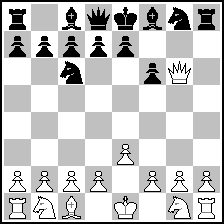 (= 15+14 ) (= 15+14 )
The mother very elegantly praised me: “Congratulations! You are such a clever boy”! Dagoberto was coming, astonished, and said to me, a little suspiciously: “So, you have played a couple of games around before coming here to beat Mama, haven’t you?”
I don’t remember what I answered to him. But why I am telling this? Well, first because I find the whole story very funny, and until today I smile when remembering the picturesque events of my childhood and youth. I believe that the most memorable facts of our lives are those in which an ensemble of coincidences and circumstances are put together to “compose” an interesting story. So, the story of my first game, which was sort a composed game, is much more interesting than the game itself. I also believe that these “composed events” can happen in the lives of everyone. And I am always attentive to observe and register in my memory these remarkable moments, which sometimes are “decisive” moments!
On the other hand, I think this applies also, to a certain extent, to the composition of chess problems and any other intellectual or artistic pursuit. I firmly believe that the chess composer should “observe” around him, he should “observe” especially his own thoughts! Sometimes, we wake up during the night, “seeing” the solution of a certain question we were working in, and what is this? In our dreams, we were “observing” our thoughts from another perspective. I believe it’s more or less the same what happens when Anand, for example, prefers to tilt his head up and analyse blindly.
But the main reason for which I tell this story is that, although at the time I hadn’t even seen any chess composition, I think the basic ingredients of a chess composer were already impressed on my personality, in embryonic form: an almost obsessive attraction to the chessboard and the game, the ability to remain long time concentrated in speculations and improvements, the love for combinations I already had as a checkers player, a certain sense of balance and economy I had already developed composing checkers problems. Around a quarter of century later, in 1988, when I composed my first chess problem, and showed it to Felix Sonnenfeld, I was sure before having his opinion that I had produced something at least publishable. Of course, everything in life is developed, nothing that matters can be static. Until today I fight hardly to improve my work as a chess composer. And I would be the most stupid and ungrateful person if I ignored the enormous amount of good, essential things I learned from the masters of our Art, and, in first place, from my master, hero, second father Felix Sonnenfeld, who was my guide and great encourager in my first steps in the magic world of chess compositions.
Now, after this long introduction, which I hope may have been entertaining (at least for my friend and master Marjan Kovačević, with whom I have been exchanging lots of stories along more than 10 years of our inspiring friendship), I would like to show a collection of my adventures on the field of chess compositions. You know, it is not everyday one turn 70 years, and I am happy for that. God bless you all!
| | | (2) Posted by Steffen Slumstrup Nielsen [Friday, Sep 25, 2020 19:25] |
Great story! And happy birthday!
| | | (3) Posted by Marcos Roland [Friday, Sep 25, 2020 19:56] |
Thank you, Steffen!
| | | (4) Posted by Alain Villeneuve [Friday, Sep 25, 2020 20:31] |
Obrigado Marcos, what a pleasure to read this, fresh air after "pickaninny delirium" !
| | | (5) Posted by Alain Villeneuve [Friday, Sep 25, 2020 20:54] |
I forgot : feliz aniversário ! You are a boy beside me, I am going to be 75 !
| | | (6) Posted by Marcos Roland [Friday, Sep 25, 2020 23:19] |
Thanks, Alain!
| | | (7) Posted by Zalmen Kornin [Saturday, Sep 26, 2020 01:57] |
Many happy returns, Marcos! Nice gallery, keep the good work. Lembra-se que eu costumava apresentar (ou talvez melhor: propor) alguns dos meus ajudados, e também outros, durante os intervalos daquelas semifinais do comecinho dos oitenta? (lá se foram quase quarenta anos...) Você era um dos melhores solucionistas daqueles meus - então - inéditos... (o que eu considerava não pequenino feito, que só o Cícero igualava).
| | | (8) Posted by Marcos Roland [Saturday, Sep 26, 2020 02:49] |
Lembro bem, Zalmen! Me lembro dum ajudado em 6, acho que foi um dos primeiros que tentei resolver. Foi muito estimulante o encontro com você. Obrigado!
| | | (9) Posted by Hauke Reddmann [Saturday, Sep 26, 2020 09:01] |
On a complete irrelevant note, I'm always a bit amused that
a "Westerner" can only think of evil ensigns (or evil
parrots :-) when hearing "Iago", where in Brazil noone ever
raises a brow. (Wiki counts at least three soccer players
known only as Iago.)
| | | (10) Posted by seetharaman kalyan [Saturday, Sep 26, 2020 11:22] |
Nice story. Happy 70 and wishing you many many more years and compositions !!
| | | (11) Posted by Zalmen Kornin [Saturday, Sep 26, 2020 13:32] |
@ Marcos: My pleasure :)
@ "What's in a name": Iago is just a variant of Jacob. Santiago = Saint Jacob. No shakespearean associations prevailing in some countries (footballer Iago Aspas is Spanish)...
EDITED later: I would like to add that Marcos' reminiscences are a very interesting reading.
| | | (12) Posted by Andrew Buchanan [Saturday, Sep 26, 2020 18:39] |
It makes very good reading: thank you and happy birthday Marcos
I thought Santiago was San Tiago - I had a Mexican friend called Tiago when I lived in Los Angeles 20 years ago. God bless him: I wonder where he is now. I didn't know Iago was another form of Jacob or James.
| | | (13) Posted by Marcos Roland [Saturday, Sep 26, 2020 20:56] |
Thank you, Andrew!
| | | (14) Posted by Marjan Kovačević [Monday, Sep 28, 2020 02:14] |
Dear Marcos, your birthday gift to all of us is a wonderful piece of chess literature!
It cries for a much wider audience, and for similar background stories behind your selected problems.
| | | (15) Posted by Marcos Roland [Monday, Sep 28, 2020 03:23] |
Thank you, Marjan! In fact, I am working in a complement to this text, containing stories about some problems. I didn't have enough energy to finish it at the desired time! But in a few days, I'll have it ready. Cheers!
| | | (16) Posted by Joost de Heer [Monday, Sep 28, 2020 08:24] |
Nice Brazilian checkers composition. It reminds me of Jules Bourquin's famous 'wall': https://toernooibase.kndb.nl/posities/opvraag/applet.php?idapplet=169339
| | | (17) Posted by Marcos Roland [Monday, Sep 28, 2020 09:29] |
Thanks, Joost! Well, Bourquin's problem I didn't know. It's fine, more complex and longer than mine. It ends with a subtle, precise, nonforced fight between the "WQ" and two black "pawns" (I don't really know the usual terms in English). I never tried the 100 square checkers. As far as I know, the 64 squares game is already computer-exhausted, while the 100 squares version is not yet. Anyway, chess is a richer game than both of them, of course. Cheers!
| | | (18) Posted by Marcos Roland [Wednesday, Sep 30, 2020 21:42] |
Thanks, Seetharaman!
| |
No more posts |
MatPlus.Net  Forum Forum  General General  The problems of my life (I) The problems of my life (I) |
|
|
|
 ISC 2024
ISC 2024 Forum
Forum  General
General  The problems of my life (I)
The problems of my life (I) 


